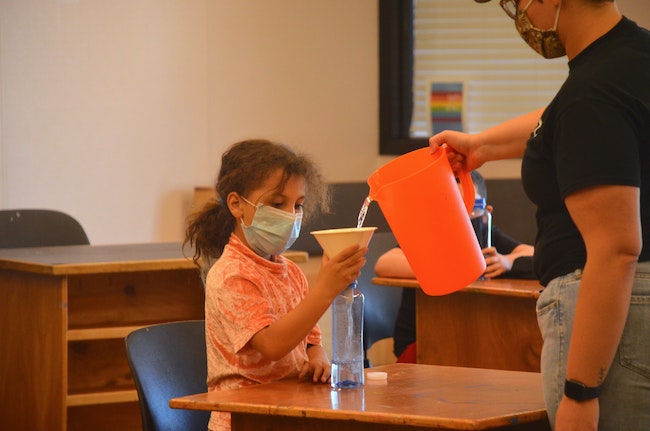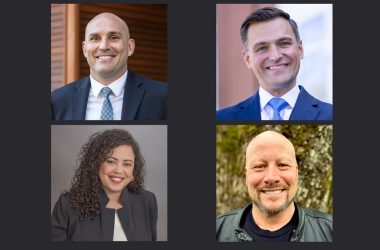
A child in day care at the Boys & Girls Club of Salem on August 13, 2020 starts on a DIY lava lamp project (Rachel Alexander/Salem Reporter)
[ NOTE: Salem Reporter is providing this information free as a community service. You can support dissemination by subscribing. ]
This article was updated to include comments from the Oregon Health Authority.
Salem parents struggling to find child care during the school day will have new options come fall at some local churches, community centers and elementary schools.
Though Salem-Keizer students won’t attend regular classes at schools until at least November, daycare and child-centered nonprofit organizations and a network of local churches are working with the school district to ensure each of the district’s 44 elementary schools has a child care program to accommodate parents who can’t supervise their children’s distance learning at home.
Child care has been top of mind for elementary school parents, with many asking about plans for the fall in school district Q&A sessions.
“My assumption is we have a huge need, but we haven’t quantified it,” said Kraig Sproles, assistant superintendent for Salem-Keizer.
The effort highlights many of the contradictions of child care in the coronavirus era. Many local programs will be housed in school lunchrooms and gymnasiums and supervised by child care workers, though current state rules don’t allow Salem teachers to be in a school building with a class of the same size.
Parents, meantime, may pay hundreds of dollars per month to send their children to child care inside a school building, where kids will sit apart from one another and attend class via computer.
Under state rules released last week, child care providers in most Oregon counties can have up to 20 kids in stable groups, doubling the 10-child limit set in March. School-age children must wear masks or face coverings, and health screenings, regular sanitizing and social distancing are required.
Separately, schools with too many local Covid cases to hold in-person classes can bring some students in for small group classes or activities to meet academic needs that can’t be met online, like special education therapies or classes like welding. But those classes are capped at 10 students in a stable group, and no more than two hours per day.
Why the difference?
“That’s not a bad question,” Sproles said with a laugh.
Melanie Mesaros, spokeswoman for Oregon’s Early Learning Division, said to date there’s no public health consensus on a safe group size for child care. But with hundreds of providers caring for Oregon kids since March, to date there have been only three reported Covid outbreaks at child care facilities, none in Salem.
“Providers are very familiar with requirements to control the spread of the virus, which include cleaning and sanitation, daily health checks, etc. Our child care providers have been doing a good job,” Mesaros said in an email.
Jonathan Modie, spokesman for Oregon Health Authority, said there’s lower risk when there’s a single group of the same children in the building every day – as with a child care facility – than when schools have multiple smaller groups of students going in and out of the building.
Providers and school district leaders said they’re focused on finding ways to serve families within the maze of state rules schools and child care providers must follow.
Tim Sinatra, CEO of the YMCA of Marion and Polk Counties, said they want to help kids stay on track with remote schooling so parents don’t have to spend hours helping kids with school after work.
“Working from home and also helping their children with their education … can be pretty stressful. We’ve heard that from many parents,” Sinatra said.
Salem Child Development Center, a nonprofit organization with local daycare, preschool and after-school programs, and the Boys & Girls Club of Salem also plan to offer programs based in elementary school gyms and lunchrooms, where social distancing guidelines can be more easily followed.
Those organizations currently run after-school programs for kids which can include snacks, help with homework and time for play and learning. Now, they’re hoping to do something similar for a full day and surveying families to gauge interest.
About a dozen local churches are also getting involved through the Salem Leadership Foundation, a nonprofit organization that helps churches identify and meet community needs in their neighborhoods.
DJ Vincent, the foundation’s deputy director, said most churches are discussing internally what they can offer, whether it’s space for an outside provider to run after-school tutoring or a daytime child care program run by church volunteers.
Vincent said church programs will likely be free or low-cost, and most would run for fewer hours than the full-day options housed at local schools.
Salem Child Development Center will likely charge families about $657 to $750 per month for full-day care at local schools, said Kristy Heitling, the center’s coordinator for Salem-Keizer programs.
The YMCA and the Boys & Girls Club haven’t worked out fees, but directors of both organizations said they intend to offer sliding scales with options for families who can’t afford care.
How those nonprofit organizations will cover their own costs is an open question. The Boys & Girls Club relies on donations and outside funding to subsidize its after-school programs, which typically cost kids only a few dollars a month.
“We serve the youth who need us the most,” executive director Sue Bloom said.
But donations have fallen during the pandemic as people tightened budgets and in-person fundraisers moved online. State rules for child care providers operating over the summer, which included fewer students in groups and more sanitizing, further lowered revenue while raising costs.
At the state level, the Boys & Girls Club is seeking emergency funding from the governor’s office to subsidize their offerings, Bloom said. But Liz Merah, spokeswoman for Gov. Kate Brown, said emergency schooling funds have been set aside to help schools, colleges and universities and won’t be available directly to child care providers. Some Oregon child care providers received other relief funds over the summer.
Sinatra said the YMCA is seeking donors to help them offset the cost of subsidized child care.
Heitling said the Salem Child Development Center plans to provide care at cost, but said donations help them keep programs affordable.
Families interested in signing up should contact their school’s regular child care provider for information.
Are you struggling to find child care that meets your family’s needs for the fall? We’d like to hear from you for future stories. Contact reporter Rachel Alexander: [email protected] or 503-575-1241.
SUPPORT ESSENTIAL REPORTING FOR SALEM – A subscription starts at $5 a month for around-the-clock access to stories and email alerts sent directly to you. Your support matters. Go HERE.

Rachel Alexander is Salem Reporter’s managing editor. She joined Salem Reporter when it was founded in 2018 and covers city news, education, nonprofits and a little bit of everything else. She’s been a journalist in Oregon and Washington for a decade. Outside of work, she’s a skater and board member with Salem’s Cherry City Roller Derby and can often be found with her nose buried in a book.









